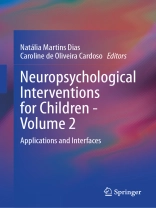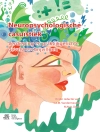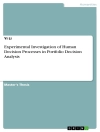This book is the second of two volumes that aim to serve as a comprehensive guide for professionals working with neuropsychological interventions especially designed for children. This second volume complements the theoretical and practical foundations presented in the first volume by presenting applications to different clinical conditions and by exploring interfaces of neuropsychology with other areas of research and practice.
Chapters in this second volume are divided into two parts. The first part presents a series of case studies, illustrating the practice and experience of neuropsychological rehabilitation and habilitation in different clinical conditions. The second part brings together chapters that discuss the interfaces of neuropsychology with different areas, which can use its knowledge and interventions (such as school neuropsychology) or which can be used as strategies within neuropsychological intervention or even compose inter and transdisciplinary partnerships in the work of promotion, stimulation, or cognitive remediation, such as the use and role of music, games and play, mindfulness, and transcranial direct current stimulation. So, chapters in this second part highlight the interfaces with other approaches, knowledges or disciplines.
Originally published in Portuguese and now available in English, Neuropsychological Interventions for Children – Volumes 1 and 2 will be of interest to professionals working with neuropsychology in clinical and school contexts. It will also be useful in neuropsychology teaching contexts (specialization courses in neuropsychology and related areas) and for students and professionals in interface areas, such as Psychology, Education, Speech Therapy, Occupational Therapy among others.
The translation of the original Portuguese version of this book into English was done with the help of artificial intelligence. A subsequent human revision was done primarily in terms of content.
Table of Content
Part I: Child Neuropsychological Rehabilitation: case studies.- Chapter 1: Neuropsychological intervention in brain injuries in childhood and adolescence.- Chapter 2: Neuropsychological rehabilitation in patients with Attention Deficit Hyperactivity Disorder.- Chapter 3: Practical model of neuropsychological intervention for Autism Spectrum Disorder: a case study.- Chapter 4: Intervention in intellectual disability: case study.- Chapter 5: Childhood Absence Epilepsy: A Historical-Cultural Neuropsychological Approach.- Chapter 6: Rehabilitation of Reading and Writing Learning Disorder.- Chapter 7: Remediation of Developmental Dyscalculia.- Part II: Childhood Neuropsychological Intervention and Interfaces with Other Approaches or Disciplines.- Chapter 8: School Neuropsychology.- Chapter 9: Play and Game: Outlining Playful Practices in the Scenarios of Stimulation and Rehabilitation of Executive Functions.- Chapter 10: Mindfulness as a strategy in child stimulation and rehabilitation.-Chapter 11: Motor Skills and Executive Functions: A Close Relationship Throughout Childhood.- Chapter 12: Play and games as tools for cognitive stimulation: Possible interfaces with neuropsychological intervention.- Chapter 13: Music and Neuropsychological Rehabilitation: Multidisciplinary Perspectives.- Chapter 14: Transcranial Direct Current Stimulation: New perspectives in the rehabilitation of children and adolescents.
About the author
Natalia Martins Dias is a professor in the Department of Psychology at Universidade Federal de Santa Catarina (UFSC), Brazil, where she coordinates the Laboratory of Cognitive and School Neuropsychology (LANCE). She holds a Ph D and a postdoctoral degree in Developmental disorders from Universidade Presbiteriana Mackenzie, Brazil. She is a member of the board of directors of the Brazilian Society of Neuropsychology (SBNp) and member of the Neuropsychology Working Group of the Brazilian National Association of Research and Graduate Studies in Psychology (ANPEPP). She is an associate researcher at the Science for Education National Network (Cp E), Brazil, and holds a productivity grant from the Brazilian National Council for Scientific and Technological Development (CNPq).
Caroline de Oliveira Cardoso is a professor at the undergraduate course of psychology of Universidade Feevale, Brazil, where she is also a permanent professorof the Academic Master’s Degree in Psychology. She is a specialist in neuropsychology and holds a Ph D in psychology with emphasis on human cognition from the Pontifícia Universidade Católica do Rio Grande do Sul (PUCRS), Brazil. She is a member of the board of directors of the Brazilian Society of Neuropsychology (SBNp) and is a member of the Neuropsychology Working Group of the Brazilian National Association of Research and Graduate Studies in Psychology (ANPEPP). She works as a clinical psychologist and neuropsychologist and is a founding partner of ‘Conectare Neuro Psi’ – Assistance, training and connections in Neuropsychology.












